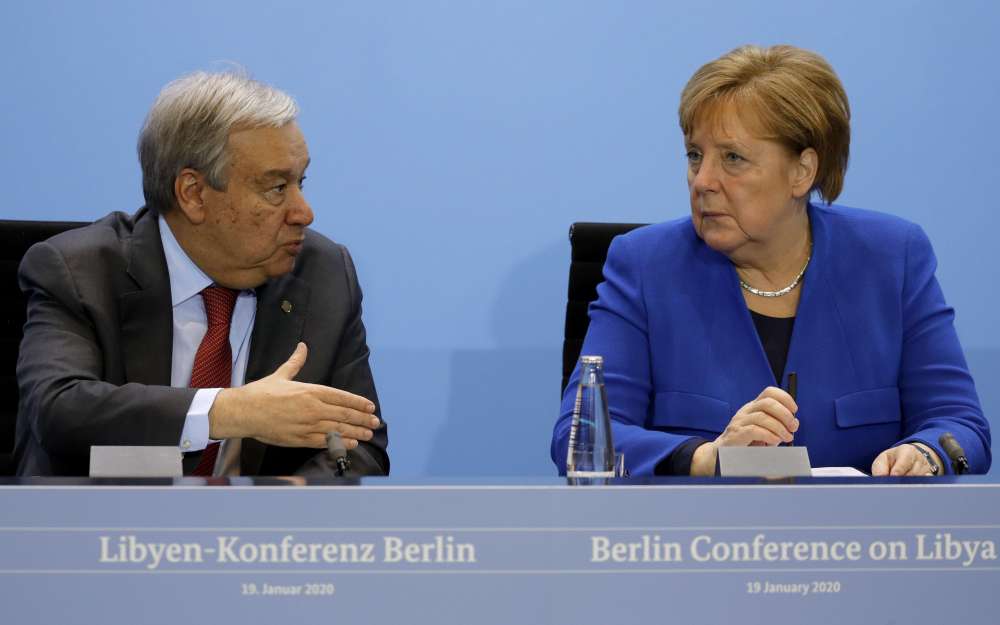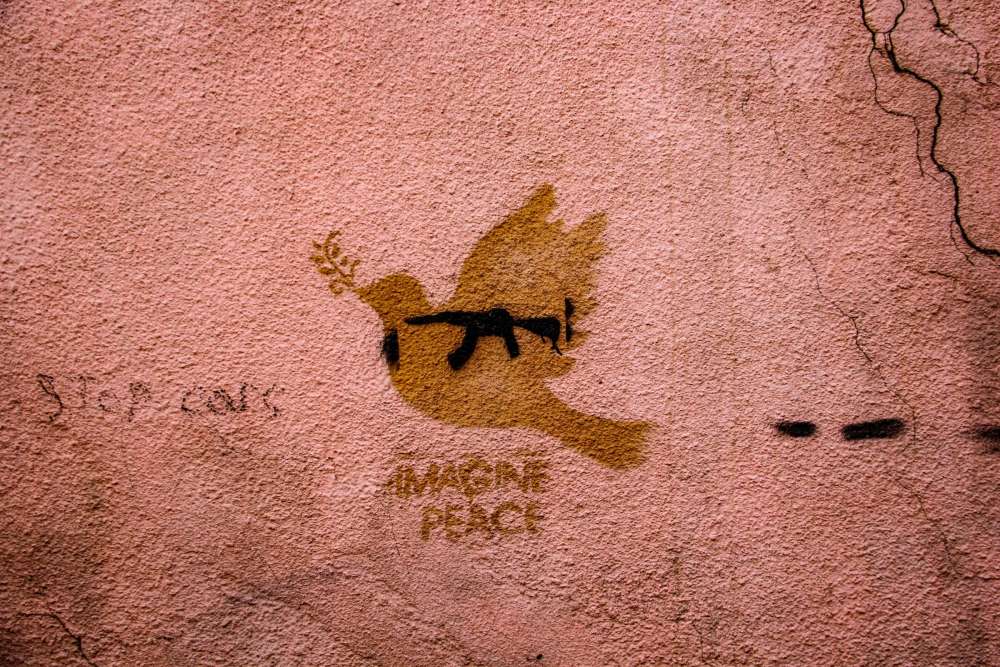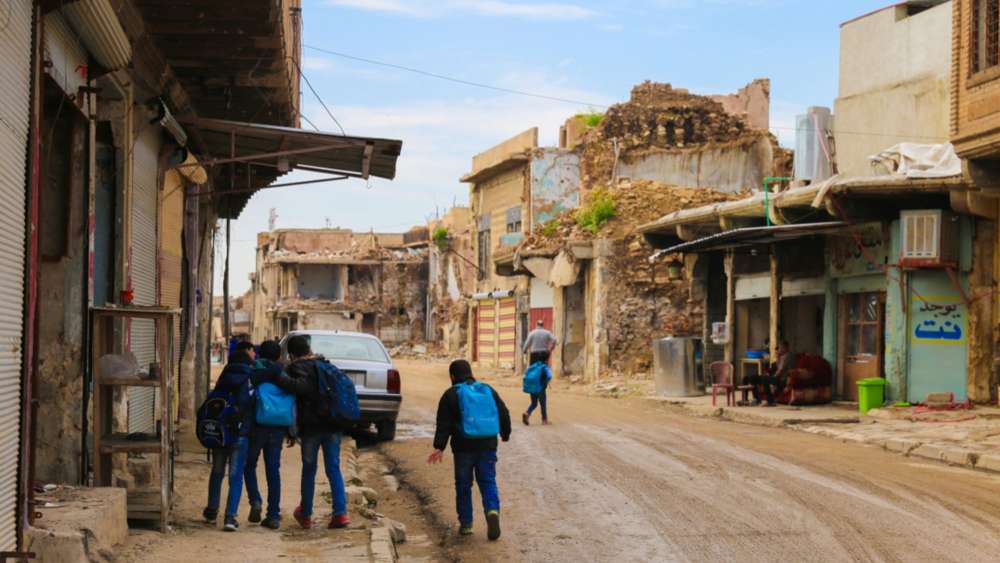“Progress in Peace Processes Often Results from Cumulative Efforts”

UN Secretary General António Guterres and former German Chancellor Angela Merkel at a press conference on the International Libya Conference in Berlin in January 2020. (OMER MESSINGER/POOL/EPA-EFE/Shutterstock)
In a world marked by rising geopolitical tensions, Germany should use its international convening power and unique strengths as a state mediator and donor to support professional peacemaking practice.
How can Germany remain a credible mediator in a world of intensifying geopolitical rivalries? In which conflict settings can Germany’s mediation efforts make a difference?
My message to Germany is: Play to your strengths! Germany has a wide diplomatic network, trusted relationships, and strong international convening power. All these things will become more important in a world marked by geopolitical tensions. Other states and non-state actors can use a more discreet approach, but whatever Germany does will draw attention.
Germany would do well to recognize and build on its unique place in the multilateral system. If it does, it will be able to play a credible and effective state third-party role. That can be especially important in inter-state conflicts: Smaller, more discreet actors may be able to line up initiatives or bring good ideas to the table. But a third party with political clout, leverage and the necessary resources will inevitably be needed to bring any initiative or agreement across the finish line, and to see it being implemented.
Mediation, or peacemaking more broadly, works. From our experience, we know that it can produce meaningful peace outcomes and real benefits for people affected by conflict. Great examples are the Black Sea Grain Initiative in Ukraine this year, which was brokered by the UN and Turkey and which has contributed not only to a deal between Russia and Ukraine on grain exports, but has also helped stabilize global food security. Or take for example the African Union-led talks that resulted in a ceasefire between the Ethiopian government and the Tigray People’s Liberation Front in November 2022, and which led to a resumption of humanitarian assistance in Tigray.
Germany can and should continue to play a strong mediation support role, meaning it should enable others to do what a state mediator may struggle to do – I am thinking of rapid and flexible operational work or engaging with designated non-state armed groups. Germany can and should step in when its unique features as an important and trusted international power and partner will add most to the resolution of a conflict.
Germany can also play a more normative role in addressing conflicts, thus helping to uphold and defend the values that underpin the UN Charter and the multilateral system as well as German values, such as democracy. At times, that will go hand in hand with being a credible third party, at times not. A smart foreign policy approach will be able to know when to prioritize each role.
» Germany can and should step in when its unique features as an important and trusted international power and partner will add most to the resolution of a conflict. «
You have served in numerous UN peacekeeping missions and now sit on the UN Secretary-General’s High-Level Advisory Board on Mediation. Based on your experience, you wrote in 2018 that the UN has lost the art of peacemaking that it had once mastered. How should international organizations like the UN adapt to successfully mediate today’s conflicts?
The UN is showing its age. The Security Council, which guides most UN action with respect to peace and security, was established almost 80 years ago. Its membership reflects the distribution of power as it was in 1945 – and has not changed since. That’s a problem. It does not mean that the UN is irrelevant, but the more the real world diverges from the make-up of the Security Council, the more the UN will need to work with partners that are less constrained by the Council’s architecture, politics and ways of working.
Jeff Feltman, the former UN Under-Secretary-General for Political Affairs, has likened the United Nations to the conductor of an orchestra: it can bring some harmony and rhythm to how various actors work on peace and security. This image certainly goes some of the way.
In Libya, for instance, the UN has helped to create the framework in which Germany was able to operate the Berlin Process, which was quite successful in ratcheting back outside interference in Libya. That framework also created room for the Centre for Humanitarian Dialogue (HD) to broker the Libyan national ceasefire declarations of August 2020 that have saved many, many lives.
But there are limits to what the organization can achieve. The United Nations was not able to do much to prevent the Russian invasion of Ukraine or to help end that war. And it doesn’t seem to be able to reduce the tensions that are building between China and the United States, which may be today’s greatest threat to global peace and security.
In such cases, the UN’s main role is normative – as guardian of the UN Charter’s prohibition of “the threat or use of force against the territorial integrity or political independence of any state.” It takes courage, and it can be frustrating, but those norms have given us the longest period of peace between major powers in human history. They are worth defending.
Key Points:
- With its reach and international convening power, Germany is uniquely positioned to act as a credible and effective state mediator in conflicts. It should use and build on these strengths.
- Germany should continue to play a strong mediation support role and work to enable other actors who can do what a state third party may struggle to do, such as rapid operational work or engaging with non-state armed groups.
- Germany can do more to use its role as a donor in support of peace mediation initiatives. At the same time, excessive demands to “attribute” positive outcomes to specific funding can adversely affect longer-term outcomes.
How can mediators strike an adequate balance between discretion and transparency in the peacemaking process? What are the challenges?
Getting that balance right is certainly not easy. Discretion plays a key role in mediation and dialogue processes, especially during the early phases when trust may still be low and a lot depends on informal contacts and explorations.
On transparency, we can think of two key aspects: a third party’s transparency toward the conflict parties, and the transparency of a peace process vis-à-vis the public. For mediators, being honest about one’s motivations, about why we mediate, is key to generating trust with conflict parties – and that can be more challenging for a state mediator who inevitably has to take into account their government’s foreign policy agenda. Transparency will also play an important part in generating public support and buy-in. Any third party would do well to think hard about how to best achieve that.
The challenges also depend on which actor runs the process. HD, one of Germany’s peacemaking partners, is a private organization known for discretion. That allows us to test creative ideas and solutions with conflict parties and third parties. But we do not have the reach or convening power of a state like Germany, which can help manage engagement with external players and the public.
» Mediation is one of the most cost-effective tools we have at our disposal to resolve or prevent conflict. «
The German Federal Foreign Office is currently funding various peace mediation initiatives. As a donor, how can it shape its funding to maximize the impact of these efforts?
There are various dynamics and challenges at play when funding peacemaking initiatives, but it’s important to remember that mediation is one of the most cost-effective tools we have at our disposal to resolve or prevent conflict.
Quite a bit has been said and written about how good donor funding can help maximize the impact of peace initiatives, and we’ve seen some movement in the right direction. But there’s more the peace sector and donors like Germany can do.
Peacemaking as a practice starts during the early stages of a conflict – or at times even before a conflict breaks out, in order to prevent its escalation. That encompasses informal activities that rely on relationships and support to conflict parties and civil society. It also requires the capacity to create and seize windows of opportunity, and to adapt when conflict situations inevitably change. And it means committing for the long term, because it can take time for conflict parties to be ready to talk, let alone find just and lasting solutions, and to then support the implementation of these agreements.
I want to emphasize again, though, that professional peacemaking practice produces real results. These include the important interim steps throughout the life of a peace process, such as maintaining channels of communication, ensuring that parties and processes are well prepared and professionally structured, and that parties are committed and serious in their engagement.
Peacemaking’s higher-level impact can include a reduction of violence, the signing and implementation of agreements, or cooperation between the conflict parties that reduces conflict-related deaths, destruction or displacement.
Often donors find themselves under pressure to ”attribute” these outcomes to their specific funding, despite the reality that progress in peace processes more often results from cumulative and multiple efforts. Excessive attribution demands can be time-consuming and may even adversely affect longer-term outcomes, for example by causing a loss of political access or social capital with belligerent parties or other influential actors.
All this can be challenging for a donor like Germany. But it also makes it all the more important to get it right. And when done right, these donor-practitioner partnerships can enable organizations like ours to take the necessary risks to get peace initiatives up and running, to set up systems that will ensure the quality of our work, and to test and foster peaceful solutions in even the most challenging circumstances.
David Harland
Executive Director, Centre for Humanitarian Dialogue (HD)
Keep on reading

„Friedensmediation beginnt nicht erst, wenn Erdogan mit Putin und Selenskyj am Tisch sitzt”
Gerade in Kriegszeiten ist Mediation ein wichtiges Instrument. Es gibt unausgeschöpftes Potenzial.

How to Design a National Security Strategy with Peace in Mind
Germany’s security will be decided in the international arena and secured through transformative approaches to conflict resolution. To draft a successful and worthy strategy, Berlin will need to approach it with a global peace mindset.

Prioritizing the Protection of Civilians in National Security
When drafting security policy, those most affected by conflict are often missing from the equation. Applying a protection lens to Germany’s upcoming security strategy would be a way of putting civilians first.